Cambridge staff not to strike, following insufficient turnout in UCU ballot
The ballot saw 629 of 1,308 eligible voters in Cambridge vote on whether to take strike action, failing to meet the 50% turnout mandated by trade union law

Insufficient turnout for a ballot on industrial action which closed last Friday means that Cambridge academics will not be striking over pay this term.
The results of the nationwide University and College Union (UCU) ballot, released yesterday, saw 79.6% of Cambridge UCU members who voted in the ballot vote in favour of striking, with a turnout of 48.1% – below the 50% threshold required legally for unions to initiate strikes.
A higher percentage of Cambridge UCU members who voted in the ballot were willing to take industrial action short of strikes – such as marking and assessment boycott – with 88.4% of the 629 members who voted.
The planned strikes had planned to protest four issues: pay, casualisation, workload, and the gender pay gap. The dispute over staff pay had been triggered by how annual pay negotiations in May between employers and employees had played out, after the Universities and Colleges’ Employers Association (UCEA) made a final offer of a 2% pay rise, which the UCU argues did not address the falling value of higher education pay which they say has declined in real terms by 21% since 2009.
By contrast, a UCU ballot over pension changes in Lent term last year had a 57.5% turnout in Cambridge, with 89.4% voting in favour of strikes. The resulting 14 days of escalating strike action in February and March saw over 1,000 staff take to picket lines as well as a five-day student occupation of Old Schools, a central University administrative building, led by activist group Cambridge Defend Education.
Dr Waseem Yaqoob, Cambridge UCU branch secretary, explained the difference as a result of the timing of the ballots: the recent ballot was conducted during a very short window at the start of Michaelmas, when many academics are at their busiest, as opposed to Lent’s ballot which took place “during a period when staff were on campus”.
He added that the Lent ballot on pensions was a “defense against a serious and permanent degradation of deferred pay, amounting to thousands of pounds per year”.
A similar trend of too low turnout was seen across the country, with only ten universities meeting the required threshold and voting in favour of action, three of which are located in Northern Ireland, where only a majority vote is required.
The National UCU has criticised the trade union laws that require it ballots to have at least 50% turnout before their results can be acted upon, arguing that they were “frustrating the wishes of members who voted for strike action over pay”.
Dr Yaqoob concurred with this, arguing that the new 2016 trade union laws meant that “if just 25 more Cambridge staff had voted in the ballot, even if they voted against strike action, we would have been able to take action. The anti-union laws need to go.”
Meanwhile, A UCEA spokesperson said that UCU's decision to opt for 147 disaggregated local ballots was a “strategic attempt to ensure they reached the required 50% threshold of their members voting in the ballot, despite this being a national dispute.”
The spokesperson noted that even if UCU had aggregated the ballot nationally, “they would still have had only 28% of their members voting to support strike action, on a 41% turnout of their members.”
They argued that insufficient turn outs in the strike action ballot “provide clear indications that the great majority of HE staff understand the financial realities for their institution and accept the balanced and fair pay outcome implemented back in August.”
UCU head of policy and campaigns, Matt Waddup said: “'These national ballot results show clear support amongst members for action over pay”, and that “UCU members will be meeting in the coming days to discuss the outcome of the ballots and the next steps in our campaign for a better deal for staff.”
Dr Yaqoob added that the Cambridge UCU is “campaigning on a wide range of fronts that relate to the issues at stake in this ballot”, including the gender pay gap.
- This article was updated on October 25th to add a comment from UCEA and to amend a misquoted statistic.
 Comment / Cambridge’s tourism risks commodifying students18 April 2025
Comment / Cambridge’s tourism risks commodifying students18 April 2025 News / Cambridge student numbers fall amid nationwide decline14 April 2025
News / Cambridge student numbers fall amid nationwide decline14 April 2025 News / Greenwich House occupiers miss deadline to respond to University legal action15 April 2025
News / Greenwich House occupiers miss deadline to respond to University legal action15 April 2025 Comment / The Cambridge workload prioritises quantity over quality 16 April 2025
Comment / The Cambridge workload prioritises quantity over quality 16 April 2025 Sport / Cambridge celebrate clean sweep at Boat Race 202514 April 2025
Sport / Cambridge celebrate clean sweep at Boat Race 202514 April 2025





